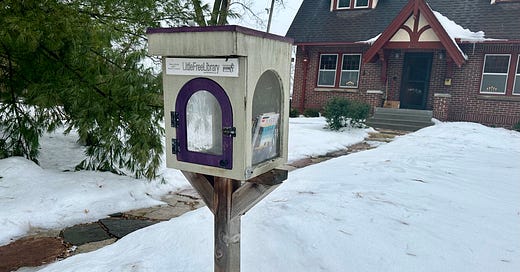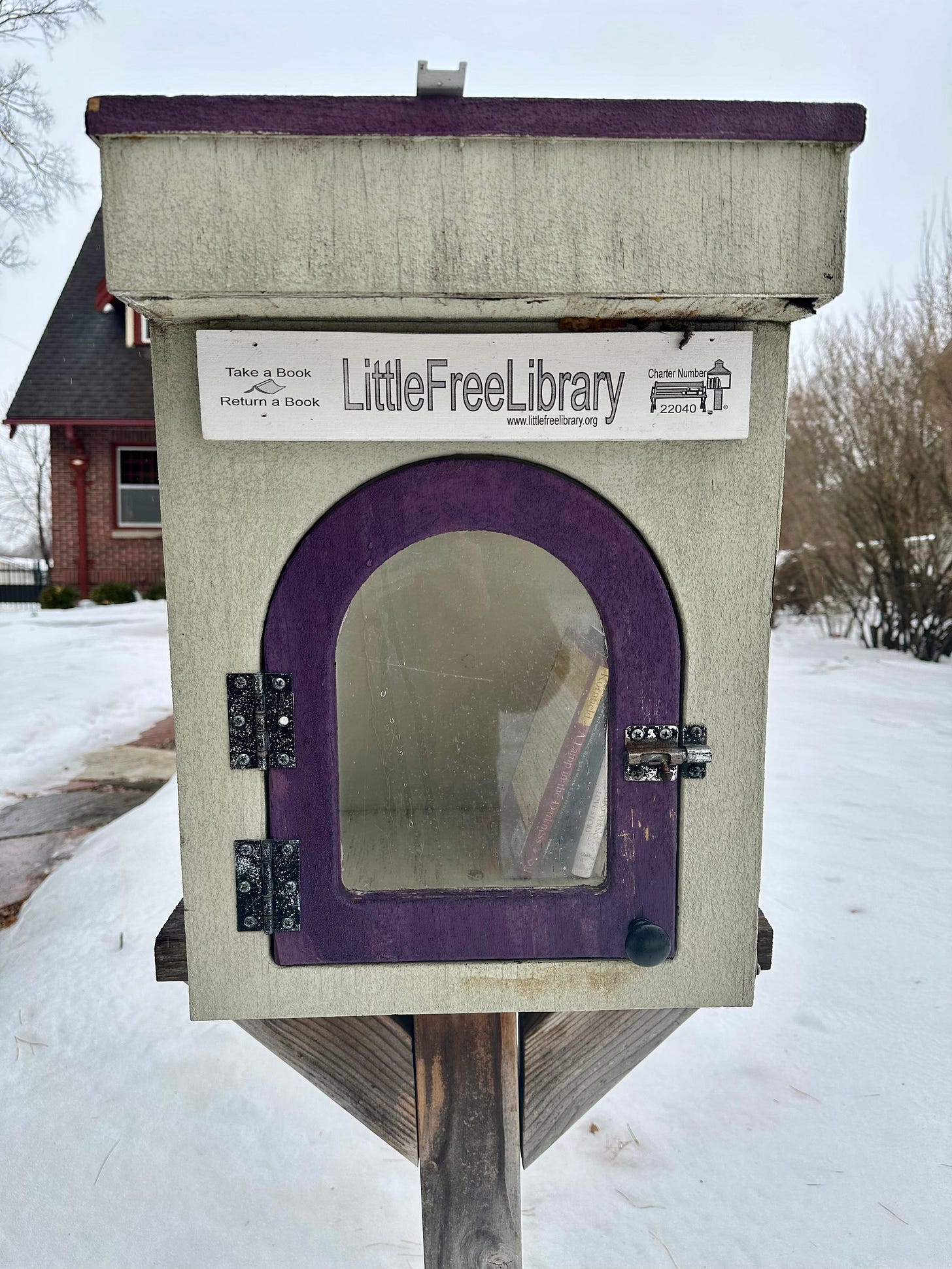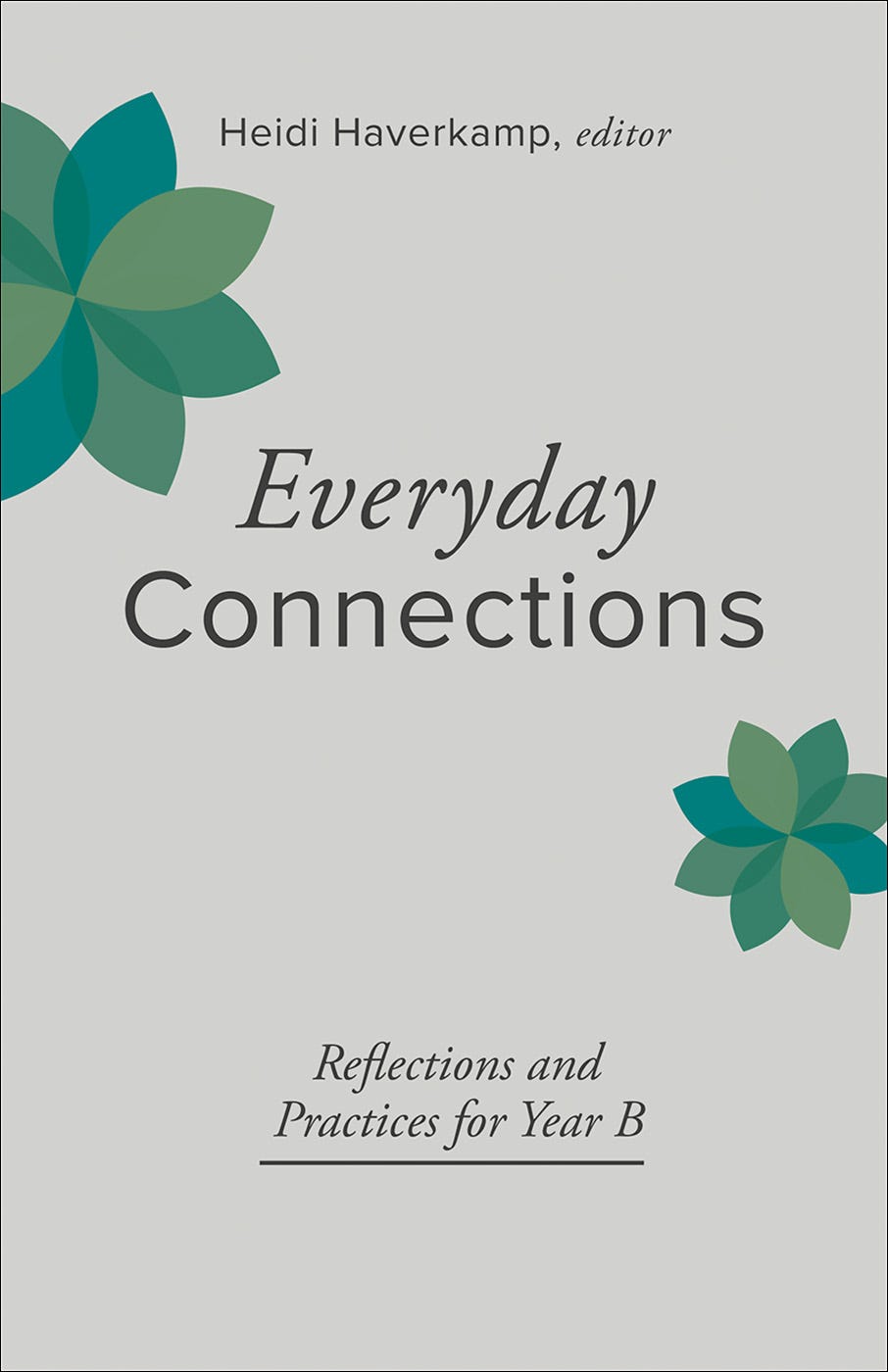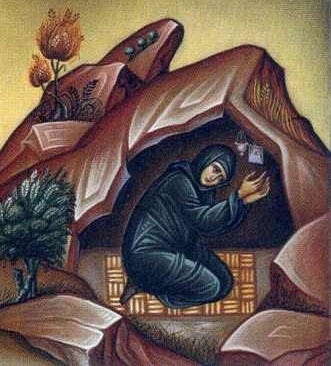There is a Little Free Library in front of our house, with purple trim and official little sign, built by the previous owner. It has a life of its own, out there on the curb. We put books we’re done reading in there and so have a surprising number of neighbors – including books that make me raise an eyebrow: about developing psychic powers, vampire suspense novels, and avoiding the devil. The first time this happened, I was weirded out and – I hate to admit this – I took three books out and threw them away. As if my Little Free Library had a “brand” that I had to maintain.
Something else that weirds me out: now and then, our Little Free Library is full of books in the morning but completely empty at the end of the day. At first, this really bothered me. Who is taking all the books? We don’t have a surveillance camera, so I can’t be sure. The story I am telling myself is that a certain person comes around once a month or so with a shopping bag, cleans out our library and the others in the neighborhood. This someone perhaps has a mental illness or hoarding problem, is selling the books for extra income to Half Price Books or on eBay, or is someone who is a little greedy. More charitably, this may be someone who imagines they are doing us a favor by emptying the library so we can put out new books since the ones that have sat there for a few weeks aren’t being taken.
Regardless, it stings when someone takes advantage of your generosity. But I don’t want to install a camera. I don’t want to police a Little Free Library! I don’t want to get tied into knots about the books that show up or the books that are taken out. I mean, there is no shortage of books around here here – after they disappear, more always appear, whether from neighbors, from Adam and me, maybe even this same person who cleans it out.
When you are giving away something for free, in some way, you are always being taken advantage of. This may be the whole point. Generosity - especially as a spiritual practice - is not about control or fairness, but gratitude that you have enough and trust someone else to use your abundance for their own good.
If I am giving something away with conditions and expectations, I am not practicing generosity but a transactional self-righteousness: “my gift, my rules.” The gift is really for me, the giver - not the receiver. Maybe generosity is really about mercy - a kind of power that we decide to give away, power transformed into compassion.
There is a saying, “It is the heart that gives, the fingers just let go.” Generosity is a gift for the giver, too, but in the sense that it grows my heart - that it teaches me to love and let go. Even if the receiver is not using my gift well, or is throwing it away, or acting poorly, in the end, that is their choice and their path and not really about me.
But this is not easy. I’m writing all these things about giving and letting go, but I am still going to get angsty the next time my Little Free Library gets emptied out.
I want to remember that, when Jesus taught his disciples to serve others in Matthew 25, he said: “Whenever you do these things, you are doing them for me.” In other words, we are giving to others not only to help them (and we have to be careful here - as Anne Lamott put it, “Help is the sunny side of control”) but to help ourselves: to meet Jesus more deeply, to trust the Holy Spirit, to believe that love is more important than fairness. I need to hear this, especially in this increasingly angry, unjust, and violent world we live in, especially with Lent coming up.
Almsgiving is one of the three ancient and traditional disciplines of Lent (with prayer and fasting). It’s a concrete and gut level practice of generosity: giving money away and not expecting anything in return. You might consider it for a Lenten practice this year. I talk about it in my Lent book Holy Solitude, suggesting a practice of giving cash away every week to someone who is asking you (panhandler, tipped workers, a donation box) or making a new donation every week to charity. It is a way to see what intentional generosity does to your mind and heart over the course of a few weeks.
Sometimes it’s joyful and sometime it’s really hard.
Like me and the Little Free Library. The books that pass through the little box in front of our house are a mini economy of generosity. Gifts flowing back and forth. The people who take them do not owe me anything, they are just moving the gifts around, somehow or other, in a way that I hope makes the world better. But who knows.
Generosity is hard, folks. But it’s worth it. In so many contexts. Or that’s what I think Jesus would say, even if he never quite put it that way.
Some news: Adam are leaving for an 18-day tour of India with a church group in a few days. I’m excited to see and learn new things, to have my mind blown by a new culture, to eat great food, and to probably also be made very uncomfortable. I know there are lots and lots of panhandlers, beggars, and desperate people in India who make their living by begging and I will be interested to notice the effect that will have on me and what I feel and think about generosity and almsgiving. I don’t think it will be easy. I look forward to telling you more after we get back.
Heidi
THINGS I AM READING
Good and Mad: Mainline Protestant Churchwomen, 1920-1980, by Margaret Bendroth (2023). I remember, now with some misgiving, priest mentors teaching me that long-standing and independent church women’s groups, with separate checking accounts and fundraisers, needed to be disbanded. But this book reminds me that these groups were so stubborn for a reason - founded by nice, angry ladies who were shut out of ordained ministry and leadership otherwise. They were a force to be reckoned with and did a lot of good. A $80 academic book, but I got it on Interlibrary Loan. It’s as readable as any popular book. (Review in The Christian Century here.)
The Desert Mothers: Sayings, Lives, and Stories of Early Christian Woman, by Laura Swan (2001). Re-reading this book about women who sought the holy out in caves in the desert is bringing me life, lately. Considering whether I want to be a part-time desert mother as well as a part-time hermit. Maybe you are, too.
“Burned out, exhausted, leaving: A new survey finds clergy are not OK” - (Religious News Service, January 2024), This article felt like a recognition of what I’ve felt, both personally and as part of a growing number of clergy I know who have left parish ministry. Church life is changing and shifting - in many ways by constricting. “Forgive reality” for being what it is, as Richard Rohr says, not in order to give up, but to let go and believe that someone new is also being born.
NEWEST BOOK
“Everyday Connections: Reflections and Practices for Year B”
When you’ve been a pastor for a minute, you can get stuck in a rut with the lectionary. . . . This book invites you into intentional conversation with the text and lifts up voices and practices to help you connect anew with the passage. My spouse is also a pastor and we may need to get another copy so they can use it for a church bible study!
Available from your favorite bookseller or from Amazon.
LENT BOOK
Holy Solitude: Lenten Reflections with Saints, Hermits, Prophets, and Rebels (2017) “You can think of the inner room of your soul as a cozy house, a simple cell, or a "vast, spacious, and plentiful" place. However you may like to imagine it, there's a place inside you where God is waiting to sit with you.”







I'm so grateful your Little Free Library had a role in the two of us meeting!
Great book recommendations!